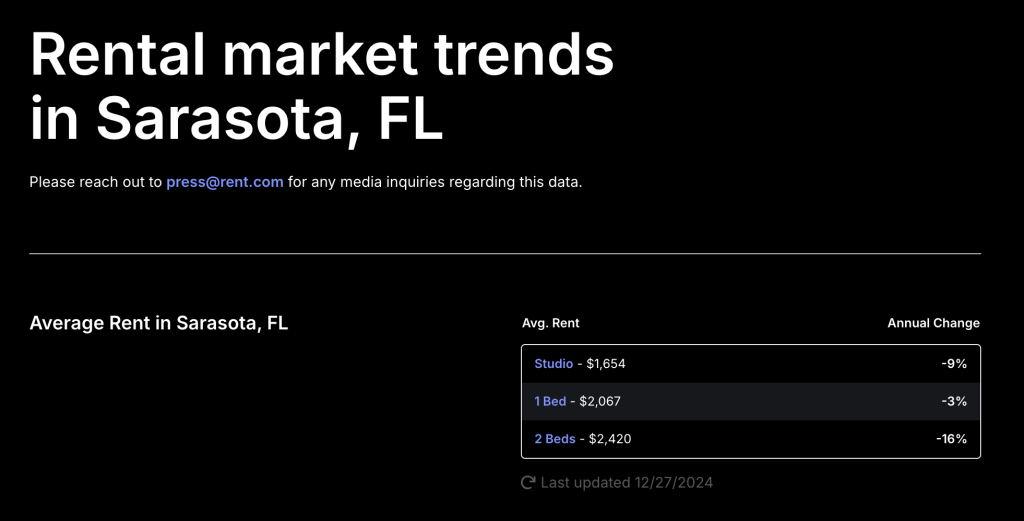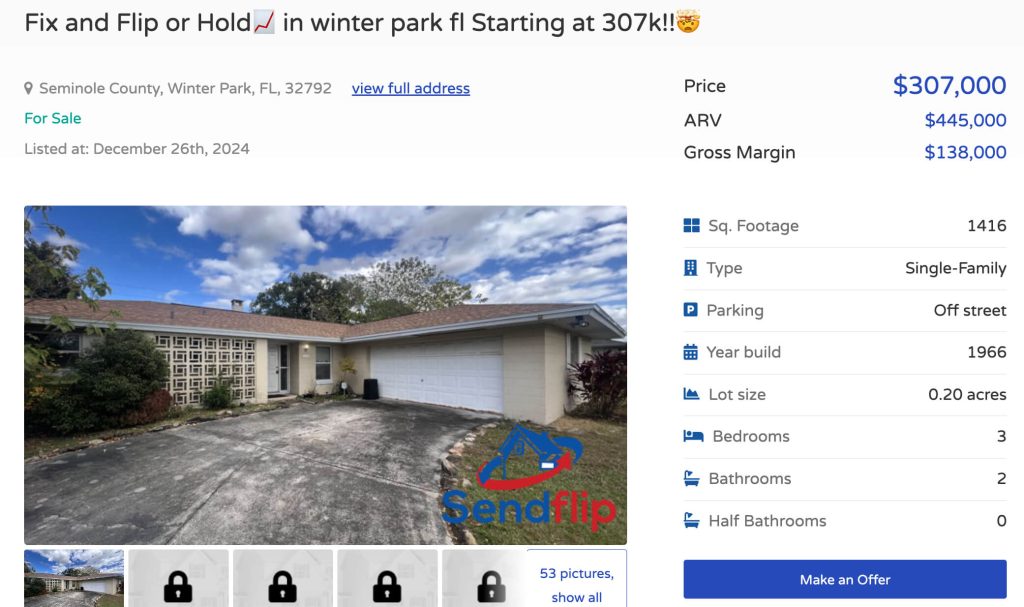This is a complete list of the 101 real estate investing tips in Florida.
After weeks of research, reading Reddit and Facebook groups.
We collected the best advice on one page.
Let’s jump right in.
Resources and Real Estate Tools
- 1. Use Rent.com for rental market trends, average rent for studio, 1 bedroom and 2 bedrooms in any city in Florida.

- 2. Use NOAA storm surge maps to make sure your investment property isn’t at high risk for storm surge before buying it.
- 3. Use USGS Elevation Tool to find the exact elevation for your property, to avoid properties affected by hurricanes.
- 4. Use USGS Topography Tool to avoid properties that flood after heavy rain.
- 5. Check the PODS and UHaul moving trends, migration trends and growth index, to see which cities in Florida are growing the fastest.
- 6. In 2025, check FEMA maps to see if your investment property has a flood designation by using their NHFL interactive tool.
- 7. Make sure your property doesn’t have radon gas by using EPA Radon Gas zoning maps.

Finding Real Estate Deals in Florida
- 8. Find off-market fix and flips on Facebook groups like Florida Fix and Flip Properties. These type of groups are very popular for wholesalers who post their off-market deals every day.
- 9. Use InvestorLift, PropStream or Invstg to find off-market real estate that isn’t accessible on the MLS.
- 10. Pay attention to tourism trends. Areas with increasing tourism often see rising property values, like Sarasota, Bradenton, Orlando, St. Pete, Clearwater, Naples and Tarpon Springs.
- 11. Meet up with local real estate agents who are active on social media. Those agents will typically have more access to sold before print deals.
- 12. Check for any CDD Fees or special assessments from the HOA before jumping on a good deal.
- 13. Speak with local real estate wholesalers about Florida’s steady stream of distressed properties from hurricanes, fires, divorces, estate sales, etc.
- 14. Bid on tax delinquent real estate properties on county government auction websites or local court houses. Every Florida county does these differently, so there’s no standard.
- 15. Scan Facebook marketplace for real estate listings. Many times this means the seller is desperate to sell and is looking for more attention.
- 16. Drive around and explore neighborhoods looking for run-down properties with motivated owners.
- 17. Look for pre-foreclosures or tax liens on property tax public records.
- 18. Attend county foreclosure auctions in person to get familiar with the process.
- 19. Don’t buy during snowbird season, which is October to May, but peaks November to April. Retirees and families come down during this period, making it more competitive to invest in real estate.
- 20. Hire a tax deed attorney to buy tax dead auctions on your behalf at local courthouses. This is what they specialize in.
- 21. Ask wholesalers for probate properties. Heirs often sell quickly, offering profitable opportunities for investors.
- 22. Build relationships with hard money lenders. When investors default on their hard money loans, they will sell off these properties at deep discounts.

Real Estate Financing Tips
- 23. Grow your real estate portfolio with DSCR loans, which rely on the property’s income, not your personal finances to get approved.
- 24. Use a private money lender for rental properties, rather than a traditional bank. Traditional banks have strict guidelines, requiring 24 months of bank statements. They also lower your credit score when mortgage payments hit your credit report and worsen your debt-to-income ratio.
- 25. Use seller financing. Negotiate directly with the seller for better terms.
- 26. Cash out refinance up to 75% LTV and buy another rental property. This only applies to investors who already own an investment property.
- 27. Avoid freezing your liquid cash, by buying distressed properties with fix and flip loans or short-term bridge loans with no rehab component.
Short-Term Vacation Rental Tips
- 28. Focus on beach vacation hotspots like Sarasota, Siesta Key, Lido Key, Longboat Key, Anna Maria Island, Destin, Clearwater, Naples and Miami.
- 29. Check local regulations, since many cities restrict short-term rentals.
- 30. Get more views on AirBnb, VRBO or Zillow by investing in professional photography. High-quality photos boost bookings.
- 31. Choose furniture that withstands heavy use. Plan to furnish with durability in mind.
- 32. Attract guests with unique amenities like pools, game rooms, or beach gear.
- 33. Increase daily and weekly rent prices by focusing on a theme, like this and this.
- 34. Market to snowbirds. Retirees flock to Florida in winter for extended stays every year.
- 35. Consider Anna Maria Island, Lido Key, Longboat Key, Florida Keys, for short-term rentals, since they thrive as tourist hotspots.
- 36. Post your vacation rental on Florida Facebook groups that focus on direct vacation rental bookings by owner.
- 37. List your short-term rental on multiple platforms, like Airbnb, VRBO, Booking.com
- 38. Use dynamic pricing tools like PriceLabs for maximum short-term rental revenue.
- 39. Find the ideal vacation rental by using real-time short-term rental data by AirDNA.
- 40. Respond to reviews right away. Addressing feedback improves your listing’s credibility and boosts in search rankings.
- 41. Hire multiple reliable cleaner. Fast turnovers require reliable cleaning services, so have a back up plan.

Long-Term Rental Property Tips
- 42. For long-term rental properties, choose family-friendly areas with the best school rankings and local playgrounds to attract stable tenants.
- 43. Check Florida’s opportunity zones, which are areas where city or county governments offer tax incentives for real estate investors.
- 44. Join local REI groups. These can opens doors to off-market deals, partnerships, and previous tenants.
- 45. Screen tenants thoroughly with background checks and income verification.
- 46. Set clear lease terms with detailed agreements. Use a Florida real estate attorney or ChatGPT to create one.
- 47. Use our ChatGPT prompts for landlords to create a lease agreement. Add additional clauses that are important to you based on the neighborhood, HOA rules or county you live in.
- 48. Invest in duplexes or triplexes to achieve economies of scale. These type of properties offer higher returns than single-family homes.
- 49. Consider pet-friendly tenants. Pet owners often pay premium rents.
- 50. Offer lease incentives or discounts for longer leases to attract more stable tenants.
- 51. Raise monthly rents gradually, small increases are less likely to drive tenants away.
- 52. Include utilities in monthly rent to simplify billing for tenants and reduce the chances of mold in your investment property. Tenants will be more likely to run the AC and the air circulation will prevent mold.
- 53. Increase monthly rent price by investing in high-end appliances like Wolf and KitchenAid.
- 54. Streamline landlord operations by using property management software like Buildium.
- 55. Invest in hurricane-resistant properties like townhomes, condos, single-family homes made of concrete or real estate further from flooding areas.
- 56. Create an emergency fund for unexpected repairs like hurricane damage, AC damage, mold or even a bad tenant.
- 57. Hire a professional property manager to handle day-to-day operations. This is what they do every day.
- 58. Offer online rent payment options. It’s convenient for tenants and helps you get payments on time.
- 59. Respond quickly to maintenance requests. Tenants will stay longer, so you can focus on other things.

Property Management Tips
- 60. Buy a wet/dry vac for $50-$100 and service your own AC every month.
- 61. Avoid costly HVAC repair costs by cleaning your air conditioner drain line and compressor soils properly.
- 62. Put less strain on your AC unit, compressor and AC fan by changing your filter every month to increase air flow.
- 63. Use MERV 6 air filters to decrease electricity costs and strain on your AC.
- 64. Use MERV 8 air filters if your tenants have a dog or cat to prevent damage to your air handler.
- 65. Make sure the outside AC unit does not have debris laying on top or near it. Clean the leaves under and near the unit to increase air flow.
- 66. Decrease your maintenance expenses, by investing in Whirlpool or Samsung appliances, which last longer. While Maytag, Frigidaire and others are cheap, they tend to break more often.
- 67. Prevent costly repairs, by having a monthly maintenance plan.

Fix and Flip Investing Tips
- 68. When fix and flipping, focus on curb appeal. A clean exterior attracts real estate buyers.
- 69. Avoid wasting money by not over-renovating. Match the quality of the neighborhood. It’s very difficult to sell the most expensive house in the neighborhood.
- 70. Avoid buying the largest house in the neighborhood. When it comes to selling, it’ll be very difficult to get a fair appraisal for buyers.
- 71. Use neutral interior colors, which appeal to the broadest audience.
- 72. Avoid legal issues by hiring licensed contractors.
- 73. When flipping, budget 5-10% for miscellaneous rehab costs.
- 74. Stage the property. Staged homes sell faster and for more money.
- 75. Focus on kitchens and bathrooms, which provide the highest ROI and best ARV (after-repair value).
- 76. Sell quickly to avoid more carrying costs and financing costs (if any). The longer you hold, the more carrying costs eat into profits.
- 77. Market aggressively on social media, flyers, open houses, Facebook groups and real estate agents who specialize in your type of properties.
- 78. Learn about how to get the highest appraisal value when flipping or selling your rental property.
Real Estate Education Tips
- 79. Find a Florida real estate mentor, so you can learn from someone experienced in the local market.
- 80. Read investment books like The Millionaire Real Estate Investor.
- 81. Participate in online forums like BiggerPockets, Reddit and real estate related Facebook groups.
- 82. Stay updated with the best cities in Florida to invest in real estate.
- 83. Use the BRRRR real estate investment strategy to buy, renovate, rent out, refinance, and repeat the process. Work with a lender that offers DSCR loans in Florida or fix to rent loans.
Legal and Tax Tips
- 84. Form an LLC to protect your personal assets from liability in case of a tenant issue, local ordinance issue or a personal issue like a personal car accident lawsuit.
- 85. Master Florida eviction laws to avoid delays and financial loss.
- 86. Defer long-term capital gain taxes by taking advantage of 1031 exchanges.
- 87. Depreciate your investment property every year for a major tax benefit.
- 88. Claim all eligible tax deductions like monthly maintenance costs, landlord insurance, travel costs, software costs, etc.
- 89. Keep detailed records for audits or disputes with the county or IRS.
- 90. Consult with a CPA, enrolled agent or a tax professional to maximize savings.
- 91. Follow Florida-specific real estate blogs to get updated on local ordinance changes, new building codes, landlord rights, tenant rights, FEMA help after hurricanes, etc.
- 92. Stay compliant to avoid legal issues by knowing 2025 Florida landlord-tenant laws.

Real Estate Market Tips
- 93. Focus on luxury condos and international buyers in Miami.
- 94. Focus on family-friendly suburbs in Tampa like Riverview, which are growing very fast.
- 95. In Orlando, invest near theme parks for strong short-term rental demand.
- 96. For affordable single-family homes in 2025, invest in Jacksonville, FL.
- 97. For waterfront properties, invest in Fort Lauderdale, Sarasota or Bradenton.
- 98. Target retirees and luxury vacationers in Naples, FL.
- 99. Get consistent rental income from college students in Gainesville, FL.
- 100. Rent in upscale neighborhoods in Sarasota to get access to luxury seeking tenants.
- 101. Rent to military families near military bases in Pensacola, Navarre, Destin and Jacksonville. These areas have a consistent need and strong rental demand.
Related to Real Estate Investing Tips in Florida
Now that you’ve learned where to invest in real estate in Florida, lets explore more options:

